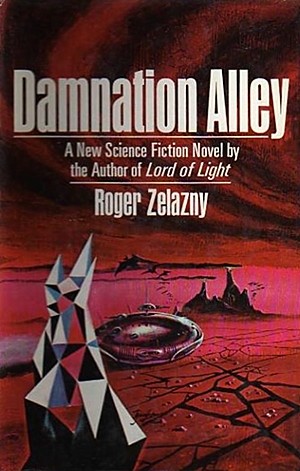 It was a nightmare, getting out of L.A. . . . The desert would be bad enough all by itself.
Something big and batlike swooped through the tunnel of lights and was gone. He ignored its passage. Five minutes later it made a second pass, this time much closer, and he fired a magnesium flare. A black shape, perhaps forty feet across, was illuminated, and he gave it two five-second bursts from the fifty-calibers, and it fell to the ground and did not return again.
To the squares, this was Damnation Alley.
It was a nightmare, getting out of L.A. . . . The desert would be bad enough all by itself.
Something big and batlike swooped through the tunnel of lights and was gone. He ignored its passage. Five minutes later it made a second pass, this time much closer, and he fired a magnesium flare. A black shape, perhaps forty feet across, was illuminated, and he gave it two five-second bursts from the fifty-calibers, and it fell to the ground and did not return again.
To the squares, this was Damnation Alley.
Damnation Alley is a really awful book with an impossible cult following. Published in 1969, it went on to be made into an even worse film staring George Peppard, Jan-Michael Vincent, and Jackie Earle Haley which as gained an even stronger cult following than the book.
How I acquired first-hand knowledge of these matters is a story too horrible to tell, at least right now. All will be revealed when I’ve made my millions and adoring fans hang on my every word. Meanwhile, I have to wonder if this shitty little book was in some way an influence on Hunter’s conceptualization of Bat Country and the fearful run from L.A. to L.V.
Zelazny’s novel is a post-apocalyptic version of the 1925 “Great Race of Mercy” — when 20 sled dog teams raced 1085 miles to bring diphtheria antitoxin to Nome, Alaska. This time it’s a suicide run from the nation-state of California across the nuke-ravaged, monster-filled wasteland with some Haffikine anti-serum — because they gots the plague way over in Boston.
Leading the a three-car team of recidivist goons is Hell Tanner, last of the West Cost Hell’s Angels. (Seriously. I wouldn’t make that up.) Tanner is a hard core sonofabitch who’s been in jail for any number of dirty deeds — including smuggling candy to the Mormons. The carrot for Tanner and the rest of the screw heads to make the trip is that they get full pardons for their crimes. . . .
This plot synopsis is somewhat beside my point.
Like with B. Traven’s Death Ship, John Bainbridge’s Super-Americans and a few other texts I’ve run across, Damnation Alley feels like it might have suggested something to Hunter and in some way informed his writing.
Everybody knows about the influence of Fitzgerald and Hemingway and Donlevy on the good doctor’s work. But Hunter’s approach to reading seems to have been , in the best sense, a shotgun affair. There is a list of books in a 2006 Harper’s article by William Kennedy (that I can’t link to because you need to subscribe in order to view it), that only hints at the breadth and depth of Thompson’s literary tastes. One might be inclined to think Hunter was indiscriminate, reading at random, but that doesn’t seem to fit. Omnivorous, certainly — with a purpose.
Traven’s writing in Death Ship has amazing rhythms and a personal, wrong guy/wrong place/wrong time sensibility mirrored in some of Hunter’s best work; Super-Americans is about Texas being the last bastion of the American Dream; Damnation Alley describes the desolation, danger, gila monsters, and high desert weirdness between Barstow and Vegas.
What else is out there he might have read and pulled from?
It’s time to finish Gonzo Republic to see if Stephenson’s worthy examination of Thompson’s writing and themes includes any intertextual analysis of the canon.